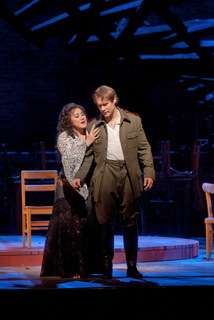|
Back
A Carmen For People Who Don’t Like Carmen (Almost) New York
Metropolitan Opera
12/31/2009 - & February 1, 5, 9*, 13, April 28, May 1, 2010
Georges Bizet: Carmen
Liam Bonner (Moralès), Maija Kovalevska (Micaëla), Brandon Jovanovich (Don José), Keith Miller (Zuniga), Olga Borodina (Carmen), Elizabeth Caballero (Frasquita), Sandra Piques Eddy (Mercédès), Teddy Tahu Rhodes (Escamillo), Earle Patriarco (Le Dancaïre), Scott Scully (Le Remendado), Maria Kowroski and Martin Harvey (solo dancers)
Metropolitan Opera Orchestra, Alain Altinoglu (conductor)
Rob Howell (sets and costumes), Peter Mumford (lighting), Christopher Wheeldon (choreography), Richard Eyre (production)

O. Borodina & B. Jovanovich (© Ken Howard)
I dislike Carmen. Operatic sacrilege, perhaps, but there, I said it. The clichéd gypsy music, the faux exoticism, the hackneyed seductress-mama’s boy-girl next door plot, the voluptuous bullfighter, the insipid dialogue, the sheer familiarity of it all, get on my nerves. I have in my time walked out on performances. Yet for some reason Carmen remains an enduring crowd pleaser, and this season the Met has launched its third new production in 25 years. Sir Richard Eyre, one of several neophytes to opera who people the Peter Gelb era’s roster of producers, has at least given us a solid effort, nearly a Carmen for people who do not like Carmen and a staging much more worthwhile than the Met’s previous two efforts, by Peter Hall (1985) and Franco Zeffirelli (1996).
Eyre, long the director of London’s National Theater and a noted film artist, seeks to update the action to the time of the Spanish Civil War, associating the military regime that came to power then with the atmosphere of sexual repression that produces the opera’s murderous passion. It is not entirely convincing. The updated dress and buildings only casually hint at the era, more in the manner of a backdrop. Eyre should, however, be credited with a very imaginative staging, which makes perhaps the fullest use of the Met’s rotating stage to date. Peter Mumford’s lighting colors the action in scarlet and red hues that suggest violence and passion. Choreographed solo ballets before each part of the performance (which has one intermission rather than the usual two) elegantly present an abstraction of the Carmen-Don José relationship. Some effects were unnecessary – I found the inclusion of the dead bull at the end too obvious and a diminution of the drama of Carmen’s murder. But for the most part Eyre succeeded in saying something new.
The opening of the production was supposed to feature Roberto Alagna and his then wife Angela Gheorghiu, but the stress of their divorce led to Gheorghiu’s departure. Alagna sang the first performances opposite Elina Garanca and has now been replaced by Brandon Jovanovich, who will perform in February before yielding the role to Jonas Kaufmann later in the season. Jovanovich, who makes his Met debut as Don José, attracted much attention at the New York City Opera. He certainly has the voice to fill Lincoln Center’s larger house, but while generally admiring the sound, I found it at times a bit rough in a way that suggests it will take a few more seasons to develop into a caliber of true excellence. Olga Borodina was never known for her great dramatic facility, but I can honestly say that I have never seen her as animated as she was in this performance. Her purring mezzo has long been an international cause of celebration and there was no sign that had changed. While she does not exactly look the part, she sang with verve and conviction. Teddy Tahu Rhodes has stood in for Mariusz Kwiecien to sing his first major role at the Met, Escamillo. The part lies too high for his attractive bass-baritone timbre, though he lacks nothing in stage presence and dramatic skill. Maija Kovalevska’s Micaëla was a pleasure to hear after getting over the role’s banality. The Met’s roster of talented comprimario singers helped the performance with especially strongly sung efforts in the opera’s lesser roles, which are usually easy to ignore. Elizabeth Caballero’s Frasquita, Keith Miller’s Zuniga, and Earle Patriarco’s Le Dancaïre forced one to take notice. I admired Alain Altinoglu’s conducting, though the earlier successes of the young Yannick Nézet-Séguin brought superior musicianship to the score.
Paul du Quenoy
|